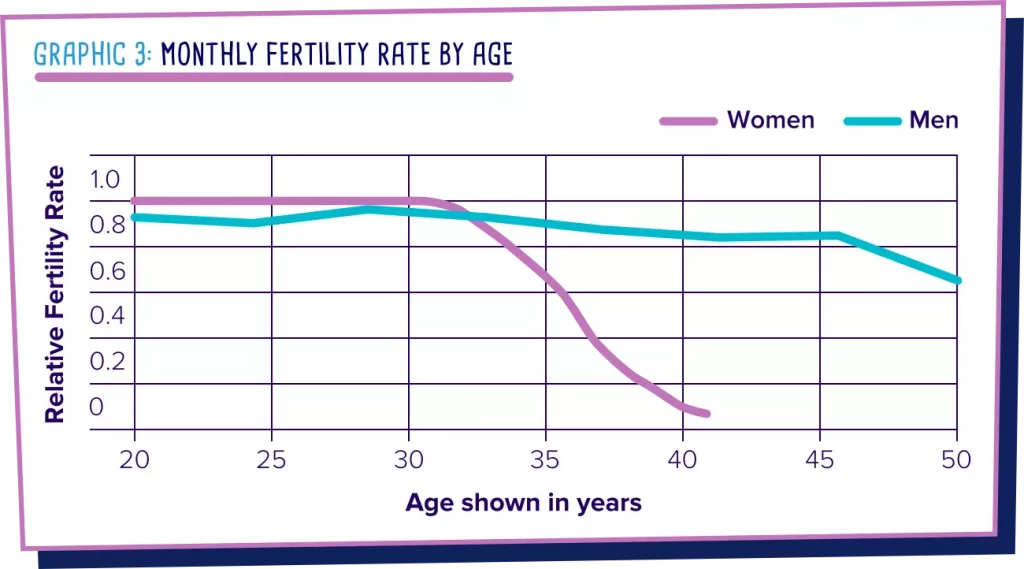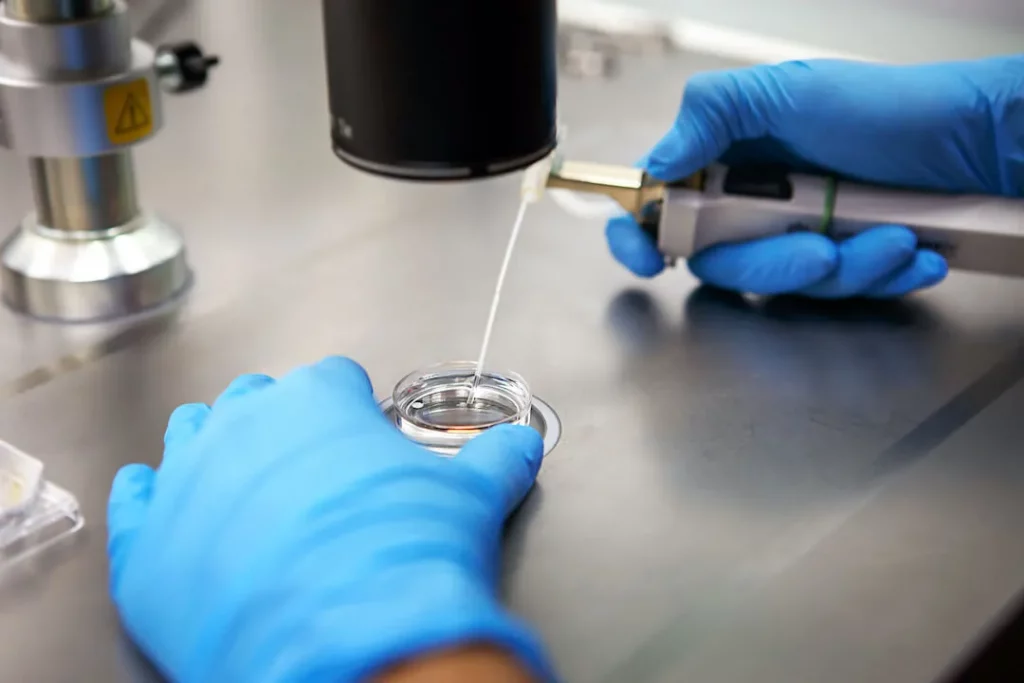This article offers men and women to find solutions to infertility, you will also learn about the types, causes, and diagnoses of infertility.
According to the Centers for Disease Control and Prevention, infertility is a widespread problem that affects more than six million couples in the United States.
What Infertility Means?
Infertility is the inability to conceive a child after one year of unprotected intercourse. It can be caused by a variety of factors in men and women.
Types of Infertility
There are two types of infertility: Primary and Secondary.
1. Primary Infertility
This is when a couple has not been able to have a child after at least one year of trying.
2. Secondary Infertility
This is when a couple has had a child in the past but is now unable to conceive.

Top 15 Causes of Infertility for both Men and Women
1. Age
Infertility rates increase as you get older (40+ Men and 35+ Women) because the quality and quantity of sperm and eggs decreases.
2. Smoking
Cigarette and all kinds of tobacco smoking can decrease the amount and quality of sperm. Smoking can also damage a woman’s ovaries and decrease the quality of her eggs because it increases the number of toxins in the body.
3. Alcohol
Drinking alcohol can reduce the number of sperm and eggs and can also interfere with the ability of sperm and eggs to join together because it can damage the cells that make up the reproductive organs.
4. Obesity
Obesity can lead to infertility in both men and women. Being overweight or obese can cause hormone imbalances and affect the ovaries and sperm.
5. Underweight
Women who are too thin can have problems ovulating. Men who are too thin may have a low sperm count.
6. Diabetes
Diabetes can cause harm to the ovaries, the sperm, and the lining of the uterus because of the high levels of sugar in the blood.
7. Medications
Some medications can interfere with fertility such as chemotherapy, radiation therapy, and some anti-inflammatory drugs.
8. Chemotherapy / Radiation Therapy
These cancer treatments can cause infertility in both men and women because they damage the reproductive organs.
9. Tumors
Tumors or cysts on the ovaries can block the fallopian tubes and prevent pregnancy because the egg cannot travel down the tube to the uterus.
10. Stress
Stress can affect a woman’s ovulation and a man’s sperm production because it can reduce the amount of sex hormones in the body.
11. Chemicals
Some chemicals, like BPA and phthalates, can interfere with fertility.
12. Environmental Hazards
Exposure to certain pollutants or radiation can damage sperm and eggs and cause infertility.
13. Hormone Disorders
Disorders like polycystic ovarian syndrome (PCOS) and thyroid problems can cause infertility in women.
14. Infections
Some infections, like chlamydia and gonorrhea, can cause infertility because they damage the reproductive organs.
15. Drug Addiction
Drug addiction can lead to infertility since it often causes hormonal imbalances and damage to the reproductive organs.

Male Infertility
Top 8 Causes of Infertility in Men
There are many causes of infertility in men. Some of the top common include:
1. Low Sperm Count
This is when a man has less than 20 million sperm per milliliter of semen. The ideal number of sperm needed for conception is at least 40 million sperm per milliliter.
2. Poor Sperm Motility
This is when the sperm do not swim or move properly.
3. Poor Sperm Quality
This is when the sperm are abnormally shaped, have low energy, or cannot penetrate the egg.
4. Low Testosterone Levels
Testosterone is a hormone that is responsible for the development and maintenance of male sex characteristics. It is also important for the production of sperm.
5. Testicles Cancer
This is cancer that affects the testicles and can cause infertility because it can damage the sperm-producing cells.
6. Sperm Blockages
This is when the sperm cannot travel from the testicles to the penis because of a blockage.
7. Retrograde Ejaculation
This is when the sperm goes backward into the bladder instead of coming out through the penis.
8. Injury of Testicles
This is when an incident causes physical damage to the man’s testicles causing low or no production of the sperm.
Female Infertility
Top 8 Causes of Infertility in Women
Similarly, there are many causes of infertility in women. Some of the most common include:
1. Ovarian Problems
This is when the woman’s ovaries do not produce eggs properly due to problems such as PCOS, cysts, or tumors.
2. Menstruation
This is when a woman has irregular or missed periods due to problems with the ovaries, the uterus, or the cervix.
3. Endometriosis
This is a condition where the tissue that lines the uterus starts to grow outside of the uterus. This can cause infertility because it can block the fallopian tubes or affect the ability of the sperm to reach the egg.
4. Problems with The Uterus or Fallopian Tubes
This can be caused by scarring from surgery, infection, or damage from abdominal radiation therapy.
5. Pelvic Inflammatory Disease
This is a serious infection of the reproductive organs that can cause infertility because it can damage the fallopian tubes or the uterus.
6. Estrogen Levels
This is when the levels of estrogen in a woman’s body are too high or too low and it can stop ovulation from happening.
7. Physical Activity
Excessive physical activity can lead to infertility in women. Women who participate in intense athletic training may not ovulate.
8. Kidney Disease
This can lead to infertility because it can cause hormone imbalances and damage to the reproductive organs.

Female Fertility Age Chart vs Male Fertility Age Chart
The following chart demonstrates how female and male fertility changes in respect to age over time:

Infertility Unexplained
Did you know, in about 30% of cases, the cause of infertility is not found!
This is called unexplained infertility. There is no known reason why the couple is unable to conceive. However, this should not stop you from diagnosing your case.
Infertility Diagnosis Options
If you and your partner are experiencing difficulty conceiving, it is important to see a doctor for a diagnosis. There are a variety of tests that can be done to determine the cause of infertility. These tests may include:
1. A Physical Exam
The doctor will examine both you and your partner for any physical abnormalities that could be causing infertility.
2. Blood Tests
The doctor may order tests to check the levels of certain hormones or to look for signs of infection.
3. Semen Analysis
This is a test that is done on the man’s semen to check for sperm count, sperm motility, and sperm quality.
4. HSG
This is an x-ray test that is used to look at the inside of the uterus and Fallopian tubes checking for any blockage.
5. Ultrasound
This is a test that uses sound waves to create an image of the inside of the body. It can be used to look at the uterus, ovaries, and Fallopian tubes. For men, the ultrasound can be used to look at the testicles for any signs of tumors or blockages.
6. SIS
This is a test that is done on the woman to look for problems with the lining of the uterus.
7. Laparoscopy
This is a surgery that is used to look inside the abdomen and pelvis. It is done with a special instrument called a laparoscope.

Solutions to Infertility
Once the cause of infertility has been determined, there are a variety of treatments that can be used to help couples conceive. Some of these treatments include:
1. Fertility Drugs
These drugs are used to stimulate the ovaries to produce eggs, such as Clomiphene citrate (Clomid) or follicle-stimulating hormone (FSH).
2. In Vitro Fertilization (IVF)
This is a procedure where the man’s sperm and the woman’s eggs are combined in a lab and then implanted into the woman’s uterus.
3. Intrauterine Insemination (IUI)
This is a procedure where the man’s sperm is injected into the woman’s uterus. This procedure is also called artificial insemination.
4. Surgery
For females, surgery may be needed to repair damage to the reproductive organs or to remove blocked Fallopian tubes. For males, surgery may be needed to remove a tumor or to correct a blockage.
5. Assisted Reproductive Technologies (ART)
This is a general term for any treatments that help couples conceive. This includes IVF, IUI, and other procedures that use fertility drugs and/or surgery.
6. Intracytoplasmic Sperm Injection (ICSI)
This is a procedure where a single sperm is manually-injected into the egg by a professional lab technician.
Infertility Yoga
Is Yoga one of the solutions to infertility?
Yes, Yoga may be able to help in some way. Yoga is a form of exercise that can help you to relax and it can improve your overall health which helps in balancing your hormones. It is also said to help improve fertility by increasing the blood flow to the reproductive organs.

More research is needed on infertility Yoga. If you are interested in trying Yoga, it is best to talk with your doctor first.
Does Infertility Last Forever?
No, infertility does not last forever. Fortunately, science and research are progressing round the clock to find solutions for infertility. There are many solutions to infertility that can be considered.
With the help of a doctor, you can find the cause of your infertility and get started on treatment. Just keep in mind that, in a few cases, the cause of infertility cannot be found or treated. In these cases, the couple may need to consider fertility treatments such as IVF or ICSI.

Don’t give up hope, there are solutions to infertility for you!
Final Thoughts
Infertility is a condition where couples are unable to conceive despite trying for a year or more. There are many causes of infertility and can be due to problems with the man or woman, or both.
Solutions to infertility exist and depend on the cause. With the help of a doctor, most couples can overcome infertility and conceive a child.
Both male and female factors can contribute to infertility. There are two types of infertility: Primary and secondary. The primary is when the couple has been trying to conceive but unsuccessful and the secondary is the inability to conceive for the second time.
There are many causes of infertility and these can be grouped into three categories: Problems with the man (i.e low sperm count, poor sperm motility..), Problems with the woman (i.e blocked fallopian tubes, irregular menstruation..), Problems with both the man and woman: (i.e diabetes, obesity..).
It’s not necessary infertility does last forever, because, with the help of a doctor, many couples can conceive a child. Solutions to infertility vary depending on the cause, but with the help of a specialist, most couples can overcome their infertility and have healthy children.
There are many possible solutions to infertility, depending on the cause. Solutions to infertility can include treatments such as medication, surgery, assisted reproductive technology (ART), or intrauterine insemination (IUI).
If you enjoyed reading this article, you may want to checkout Men’s Fertility: How to Increase Sperm Count and Motility and Erectile Dysfunction from Diabetes, Alcohol and Hypertension and Testosterone Health Benefits for Men.
References: